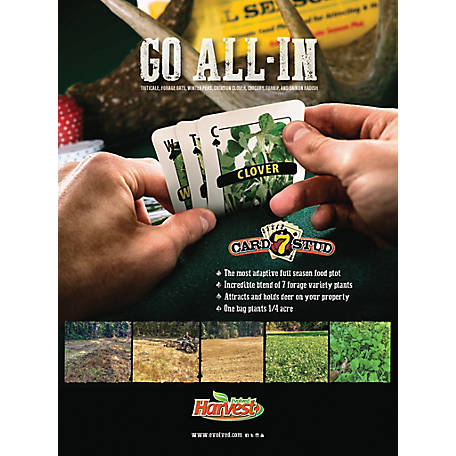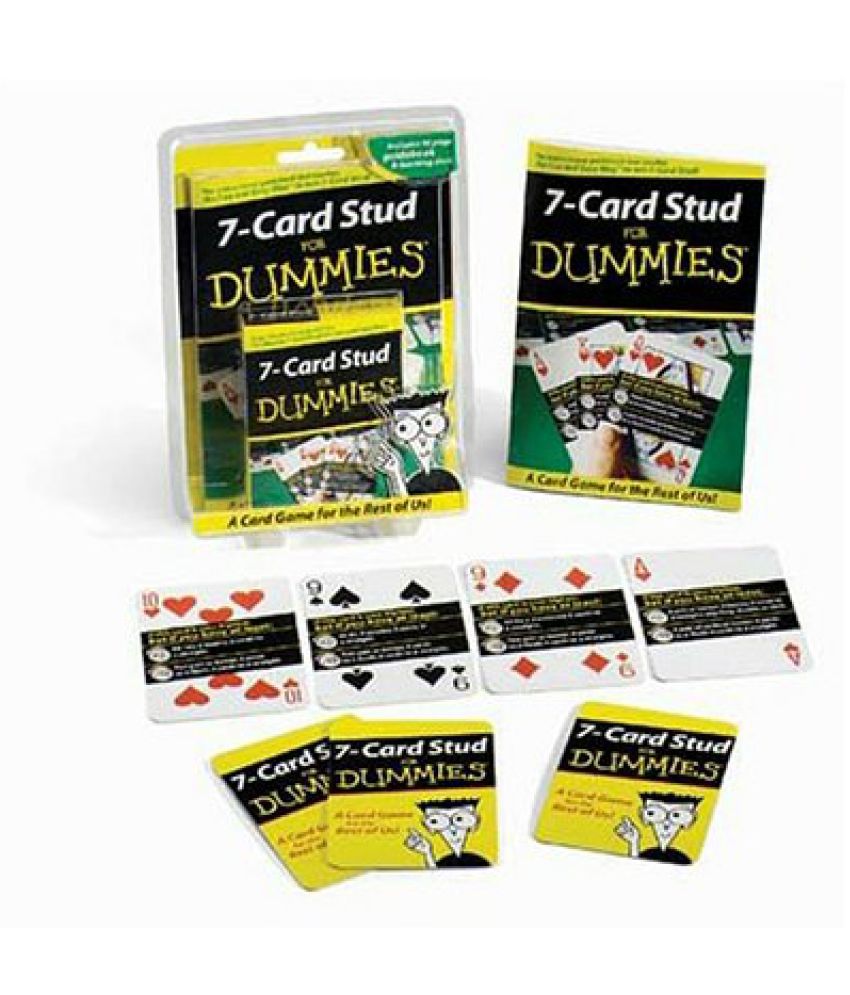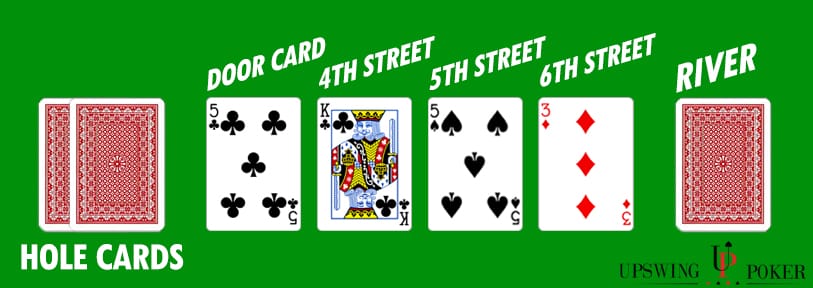How To Deal 7 Card Stud
The initial deal consists of two private cards and one up card An example of a seven-card stud game, when the antes are posted: Seven-card stud can be played for all sorts of stakes. A $2/$4 game would. Seven-card stud can be summarized therefore as 'two down, four up, one down'. Upon showdown, each player makes the best five-card poker hand they can out of the seven cards they were dealt. Seven-Card Stud Seven-card stud is played with two downcards and one upcard dealt before the first betting round, followed by three more upcards (with a betting round after each card) and one more.
How To Win 7 Card Stud
Seven card stud (also referred to as 7 card stud) is similar to Texas hold’em in so far as you use your best five cards out of a total of seven to make your best poker hand. All the hand values remain the same, as it is still poker. However, it is not a board game like hold’em that has common cards that everyone can use. Each player receives his own seven cards that are not shared. While hold’em is often a game of high cards, seven card stud is a game of live cards – so remember to keep an eye on what’s been mucked and commit this information to memory.
Ok, now we'll get into the rules, how everything is laid out, and how you actually play 5 Card Stud. Shuffle Up and Deal. The game starts with each player posting an Ante, which is a small forced bet that is.
Please note: this lesson assumes that you already know the rules of poker and are familiar with how to play Texas hold’em – including an understanding of poker hand rankings and other basic concepts.
The Setup and Initial Deal
The typical setup of 7-card stud is as follows:
- A full table seats a maximum of 8 players
- It is played using a fixed-limit betting structure
- Everyone posts an ante to begin (blinds are not used)
- The initial deal consists of two private cards and one up card
An example of a seven-card stud game, when the antes are posted:

Seven-card stud can be played for all sorts of stakes. A $2/$4 game would generally have a $0.25 ante – and this gives the players something to shoot for right from the start.
The Bring In
The lowest face up card is forced to ‘bring it in’ meaning they are obligated to make a bet. The forced bet in a fixed-limit game is generally lower than the small bet. For example, in a $2/$4 game the forced bring in would usually be $1.
If two or more players share the lowest ranked card then suits are used to determine which card is lowest. From highest to lowest, suits are ranked as follows; spades, hearts, diamonds and clubs. The lowest card in the deck is therefore the . If that card appears as one’s up card, which is called your door card, that player is forced to make a bet.
The Betting Rounds
There are five betting rounds in seven card stud versus only four in hold’em. After the bring in has been posted the action moves clockwise around the table. Players can call the initial bet, raise, or fold. When an opponent folds his cards are mucked, including their door card. Remember the exposed cards – as you may need one of that suit or rank later in the hand.
After this initial round of betting, called third street, each poker player who is still in is dealt another face up card called fourth street:

At this juncture another major difference between hold’em and seven card stud emerges. In hold’em the positional considerations stay the same throughout the hand. Beginning on fourth street the action starts with whomever has the highest board whether that be the highest card or a pair. if a player has an exposed pair showing on fourth street then they may be at the higher limit at this stage.
There is a round of betting and then another up card is dealt to each live player, called fifth street:
On fifth street the betting limit doubles. In a $2/$4 game, the minimum bet would be $4. Another betting round ensues and the sixth street card, which is the final up card for all to see, is dealt:
After another round of betting the final card, seventh street, or the river, is dealt:
The final card is dealt face down giving each active player a total of three down/private cards and four up cards for all to see. A final round of betting ensues and then the showdown.
As you can imagine there are many surprises at the river in seven card stud. This nuance of the game should alert the astute reader that your opponent’s betting patterns may well be worthy of more scrutiny than in hold’em.
Strategic Considerations
Hand reading becomes much more of an art in seven card stud than in hold’em since each player ends up with three private cards. In our example the player could be have A-T and have a straight. It’s also possible that a player could actually hold a full house or quads (four of a kind) without a pair showing.

The value of live cards is the main reason seven card stud is a more difficult game to master. In hold’em the board is always there to refer to as are your two hole cards. In seven card stud when an opponent folds his cards you need to remember them as you may need one of that suit or rank later in the hand. This concept of “live cards” is critical to playing stud well.

Related Lessons
By Tom 'TIME' Leonard
Tom has been writing about poker since 1994 and has played across the USA for over 40 years, playing every game in almost every card room in Atlantic City, California and Las Vegas.
Related Lessons
Related Lessons
Rounds of Betting
How Do You Deal Seven Card Stud
- Opening deal- Each player is dealt two cards face down, which are known as hole cards or pocket cards.
- First round of betting- Starting with the player to the left of the big blind, each player can call the big blind, raise, or fold. The big blind has the option to raise an otherwise unraised pot.
- The flop- The dealer burns a card, and then deals three community cards face up. The first three cards are referred to as the flop, while all of the community cards are collectively called the board.
- Second round of betting- Starting with the player to the left of the dealer button, each player can check or bet. Once a bet has been made, each player can raise, call, or fold.
- The turn- The dealer burns another card, and then adds a fourth card face-up to the community cards. This fourth card is known as the turn card, or fourth street.
- Third round of betting- It follows the same format as the second round, but the size of the bets have usually doubled in limit games.
- The river- The dealer burns another card, and then adds a fifth and final card to the community cards. This fifth card is known as the river card, or fifth street.
- Final round of betting- It follows the same format as the second and third rounds.
- The showdown- Using the best five-card combination of their hole cards and the community cards, the remaining players show their hands, with the bettor or last raiser showing first. The highest five-card hand wins the pot. (In case of a tie, the pot is evenly split among the winning hands.)
How Do You Deal 7 Card Stud
- These rules deal only with irregularities. SeeButton and Blinduse for rules on that subject.
- If the first or second hole card dealt is exposed, a misdeal results. The dealer retrieves the card, reshuffles, and recuts the cards. If any other holecard is exposed due to a dealer error, the deal continues. The exposed card can not be kept. After completing the hand, the dealer replaces the card with the top card on the deck, and the exposed card is then used for the burncard. If more than one hole card is exposed, this is a misdeal and there must be a redeal.
- If the flop contains too many cards, it must be redealt. (This applies even if it is possible to know which card is the extra one.)
- If the flop needs to be redealt because the cards were prematurely flopped before the betting was complete, or the flop contained too many cards, the board cards are mixed with the remainder of the deck. The burn card remains on the table. After shuffling, the dealer cuts the deck and deals a new flop without burning a card.
See Explanations,discussion #2, for more information on this rule. - If the dealer turns the fourth card on the board before the betting round is complete, the card is taken out of play for that round, even if subsequent players elect to fold. The betting is then completed. The dealer burns and turns what would have been the fifth card in the fourth card's place. After this round of betting, the dealer reshuffles the deck, including the card that was taken out of play, but not including the burn cards or discards. The dealer then cuts the deck and turns the final card without burning a card. If the fifth card is turned up prematurely, the deck is reshuffled and dealt in the same manner.
See Explanations,discussion #2, for more information on this rule. - If the dealer mistakenly deals the first player an extra card (after all players have received their starting hands), the card is returned to the deck and used for the burn card. If the dealer mistakenly deals more than one extra card, it is a misdeal.
- If you are playing the board, you must so declare before you throw your cards away; otherwise you relinquish all claim to the pot.